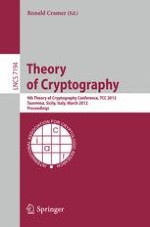2012 | OriginalPaper | Buchkapitel
Computational Extractors and Pseudorandomness
verfasst von : Dana Dachman-Soled, Rosario Gennaro, Hugo Krawczyk, Tal Malkin
Erschienen in: Theory of Cryptography
Verlag: Springer Berlin Heidelberg
Aktivieren Sie unsere intelligente Suche, um passende Fachinhalte oder Patente zu finden.
Wählen Sie Textabschnitte aus um mit Künstlicher Intelligenz passenden Patente zu finden. powered by
Markieren Sie Textabschnitte, um KI-gestützt weitere passende Inhalte zu finden. powered by
Computational extractors
are efficient procedures that map a source of sufficiently high min-entropy to an output that is computationally indistinguishable from uniform. By relaxing the statistical closeness property of traditional randomness extractors one hopes to improve the efficiency and entropy parameters of these extractors, while keeping their utility for cryptographic applications. In this work we investigate computational extractors and consider questions of existence and inherent complexity from the theoretical and practical angles, with particular focus on the relationship to pseudorandomness.
An obvious way to build a computational extractor is via the “extract-then-prg” method: apply a statistical extractor and use its output to seed a PRG. This approach carries with it the entropy cost inherent to implementing statistical extractors, namely, the source entropy needs to be substantially higher than the PRG’s seed length. It also requires a PRG and thus relies on one-way functions.
We study the necessity of one-way functions in the construction of computational extractors and determine matching lower and upper bounds on the “black-box efficiency” of generic constructions of computational extractors that use a one-way permutation as an oracle. Under this efficiency measure we prove a direct correspondence between the complexity of computational extractors and that of pseudorandom generators, showing the optimality of the extract-then-prg approach for generic constructions of computational extractors and confirming the intuition that to build a computational extractor via a PRG one needs to make up for the entropy gap intrinsic to statistical extractors.
On the other hand, we show that with stronger cryptographic primitives one can have more entropy- and computationally-efficient constructions. In particular, we show a construction of a very practical computational extractor from any weak PRF without resorting to statistical extractors.
